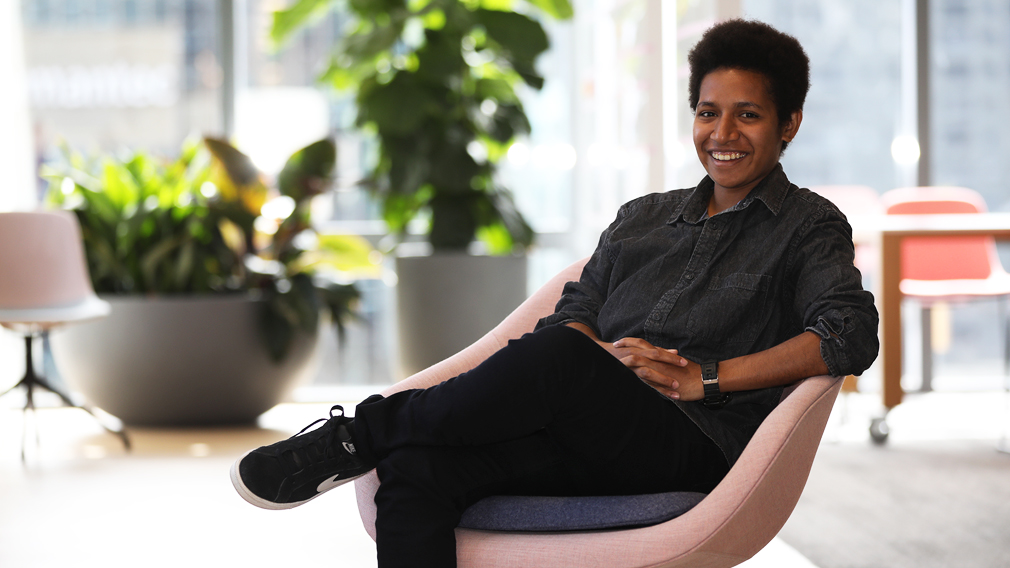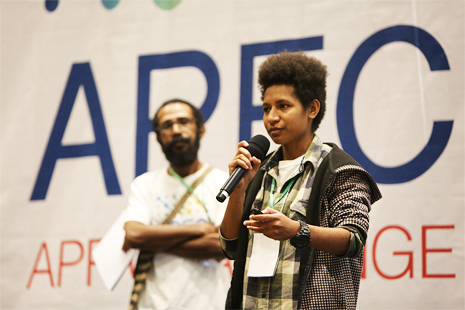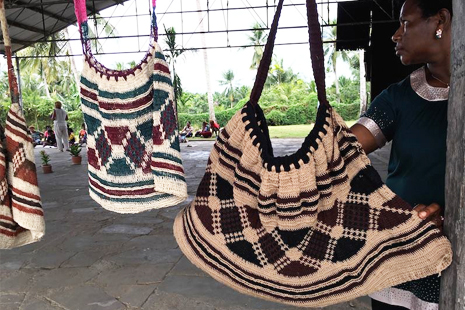The 20-year-old PNG woman taking on tech

Papua New Guinean software engineer Crystal Kewe during a visit to Australia earlier this month. (Emma Foster)
Crystal Kewe is no ordinary 20-year-old.
A self-taught software engineer in Papua New Guinea’s Port Moresby, company co-founder at age 15 and a female in a country with major gender inequality. It’s not your typical tech journey.
But today, as chief technical officer of her software development company Crysan Technology, Kewe manages multiple teams – from San Francisco to Nepal – working on technology projects which have caught the eye of governments, tech giant Google and regional development groups alike.
“She was always one of these kids that would be pushing the boundaries, out there, excited to learn,” says Stan Joyce, a PNG business leader and managing director of large PNG beverage company SP Brewery, who has known Kewe and her family for many years.
“She's gone into a new, unchartered area for PNG, and she's writing the book on it. She’s doing more than forging the path, she’s a trailblazer,” adds Joyce, also a board director of Westpac PNG, which named Kewe as winner of this year's Westpac Outstanding Women awards in the Young Achiever category.
Beyond Kewe’s age, her rise as a budding technology leader is that much more remarkable due to her upbringing in PNG, where only 8 per cent of its 8 million people are online and the tech scene is embryonic. Further, less than one quarter of women have paid jobs and there is no female representation in parliament.
“It’s definitely not like Silicon Valley,” she says light-heartedly.
But it’s perceptions around this fact that also fire up the energetic entrepreneur, expressing frustration that the capability of local technology start-ups can often go unrecognised, despite the growing pool of talent.
“We’ve worked hard to build up our software development and technology capabilities to meet international standards and we're at a point now we can bid competitively against international software companies,” she says.
“We also have the benefit as a local company that we understand the market, the environment, the economy. We know the challenges and the struggles, so we’re better equipped than firms outside PNG to develop solutions.”
Her determination has paid off, Kewe’s company – which she founded with her father and managing director Jonathan – winning a number of national project contracts, such as a public-private-partnership with the PNG government to build a platform to improve transparency of how the country’s public development funds are spent.

Crystal Kewe presents during the APEC App Challenge in May as her father and business co-founder Jonathan looks on. (APEC website)
Kewe’s love of technology was sparked at a young age, having been surrounded by computers brought home by her father who was a business consultant with a keen interest in software engineering.
After weening herself off computer games, her attention shifted to programming around age 12, a time when she also realised her potential was not being recognised at school and her self-learning saw her outpace her peers. A few years later, she’d left school and started Crysan Technology.
“A lot of people may say I was naïve. It’s a big risk not having a grade 12 certificate,” says Kewe, who continues to study through a self-created “learning framework”.
“Fortunately my father understood my situation so he didn't force me to go through conventional education. But he advised that education is important, and that’s why I take it so seriously.”
Kewe’s star is rising outside her home country, reflected in mounting appearances at forums around the Pacific Region including recently in Australia at the Department of Foreign Affairs and Trade supported Pacific Connect conference, and at Sydney fintech hub Stone & Chalk.
Boosting attention has been “Biluminous”, an online platform that connects local artisanal weavers of bilums – traditional shoulder bags – directly with buyers. Delivered in partnership with US tech giant Google and the Asia Foundation as reward for winning this year’s APEC App Challenge, the platform is expected to launch in November.
Kewe says Biluminous differs from existing e-commerce websites through plans to improve financial inclusion and digital literacy of “bilum mamas” – PNG’s colloquial name for the weavers. It aims to displace the “middle men” who take a cut of the sale of bilums, often as high as 80 per cent, by enabling weavers to be paid directly using an internet payment gateway provided by Westpac.
PNG is one of several countries in the region where a large proportion of the population is “unbanked”, with fewer than an estimated 12.5 per cent of women holding bank accounts. Kewe is looking to tackle the issue and also enable weavers to receive full value for their work, which should improve their understanding of sales performance through data collected by Biluminous.
“We’ll give her a report and, for example, if she's doing six designs and five are not performing well, she can say ‘let me focus on producing more of the one that is’. That’s the Importance of data,” she says.
Weavers’ personal stories will also be profiled, not just their bilums, to showcase each woman’s artisanal skill and their product’s authenticity, quality and cultural significance, in response to consumers’ growing desire to know more about “the hand behind the product”.

Bilums from PNG’s Yamok village. (Bilum Export and Promotion Association Facebook)
A flow-on benefit for the weavers is improved digital literacy. “We found a way to start off by connecting weavers to the platform through SMSs. But longer term, our vision is to expand and help the weavers to become digitally literate and receive emails, and for those who have never read or written before they will learn how to read and write as well.”
In addition to providing funding, Google Cultural Institute is helping to capture the stories of the weavers, Asia Foundation is providing technical teams located in Nepal and San Francisco, and Kewe has oversight of all technical and operational aspects of the project.
Asia Foundation senior director John Karr says he believes Kewe's Biluminous project can "catalyse a discussion" on how PNG's business environment can be optimised for local digital entrepreneurs.
"That includes a whole range of issues and particularly the need to promote payment solutions that make it possible for local business to transact online. If we get the policies right then PNG’s digital entrepreneurs will be empowered," Karr says.
Kewe recognises her unique position has made her a role model in PNG, something for which she feels great personal responsibility and privilege, but also must devote a lot of hard work and commitment.
But it doesn’t appear to be slowing Crysan Technology down.
In addition to delivering Biluminous, her team of six PNG employees and 25 off-shore software engineers – across Brazil and Poland – are busy on several big projects, such as building a national voting system for the PNG government and a project management system for the governor of West New Britain province.
Longer term, she wants to move the company to a more specialised niche: advanced algorithms for systems like artificial intelligence or machine learning, to provide solutions to major social issues in PNG, the region “and eventually in the world”.
“Who knows? Maybe one of our algorithms will be used to power the next Rover to another planet. Our aspirations are big.”



